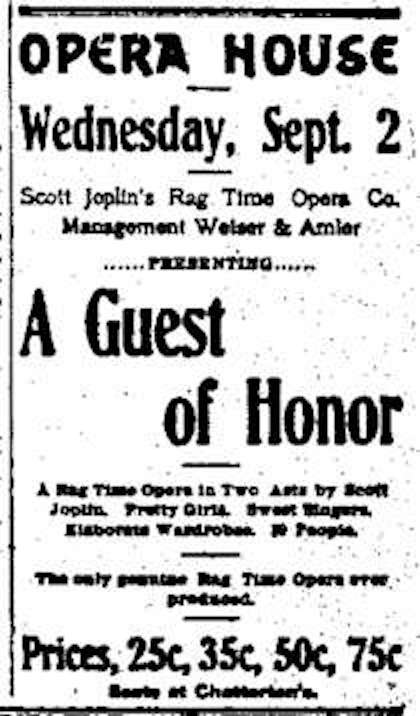A Guest of Honor (lost score to Scott Joplin opera; 1903): Difference between revisions
(Created page with "{{LMW |title=A Guest Of Honor |description=lost score to Scott Joplin opera |startyear=1903 |timeframe=No |image=Guest-Of-Honor-Ad.jpg |imagecaption=Newspaper Advertisement fo...") |
No edit summary |
||
| Line 12: | Line 12: | ||
<b>"A Guest Of Honor"</b> was a 1903 opera written by famous ragtime composer Scott Joplin. The opera dramatized African-American civil rights leader Booker T. Washington's 1901 White House dinner with President Theodore Roosevelt, a historic visit met with condemnation from Roosevelt's political opponents.<ref>[https://www.scottjoplin.org/joplin-biography.html Article by Edward Berlin, Joplin's leading biographer, which discusses A Guest Of Honor] Retrieved 08 Feb '21</ref> | <b>"A Guest Of Honor"</b> was a 1903 opera written by famous ragtime composer Scott Joplin. The opera dramatized African-American civil rights leader Booker T. Washington's 1901 White House dinner with President Theodore Roosevelt, a historic visit met with condemnation from Roosevelt's political opponents.<ref>[https://www.scottjoplin.org/joplin-biography.html Article by Edward Berlin, Joplin's leading biographer, which discusses A Guest Of Honor] Retrieved 08 Feb '21</ref> | ||
Joplin filed a copyright application for the opera with the Library of Congress in 1903, but he did not include a copy of the score with the application. In the following months, Joplin established a company to tour the opera across several Midwestern states. Early in the tour, a company associate stole the box office receipts, severely damaging their financial situation. The tour was abruptly aborted in Pittsburgh, Kansas, when Joplin could not afford the company's payroll and lodging. As a result, all of Joplin's belongings, including the opera score, were confiscated inside of a trunk until Joplin could pay for the rent. The music was never published, and no copy of the score has ever resurfaced.<ref>[https://www.jstor.org/stable/3051573?seq=1 Article discussing the copyright application and its circumstance of being lost] Retrieved 08 Feb '21</ref> | Joplin filed a copyright application for the opera with the Library of Congress in 1903, but he did not include a copy of the score with the application. In the following months, Joplin established a company to tour the opera across several Midwestern states. Early in the tour, a company associate stole the box office receipts, severely damaging their financial situation. The tour was abruptly aborted in Pittsburgh, Kansas, when Joplin could not afford the company's payroll and lodging. As a result, all of Joplin's belongings, including the opera score, were confiscated inside of a trunk until Joplin could pay for the rent. Joplin never returned for the trunk. The music was never published, and no copy of the score has ever resurfaced.<ref>[https://www.jstor.org/stable/3051573?seq=1 Article discussing the copyright application and its circumstance of being lost] Retrieved 08 Feb '21</ref> | ||
==Reference== | ==Reference== | ||
{{reflist}} | {{reflist}} | ||
Revision as of 02:45, 9 February 2021
"A Guest Of Honor" was a 1903 opera written by famous ragtime composer Scott Joplin. The opera dramatized African-American civil rights leader Booker T. Washington's 1901 White House dinner with President Theodore Roosevelt, a historic visit met with condemnation from Roosevelt's political opponents.[1]
Joplin filed a copyright application for the opera with the Library of Congress in 1903, but he did not include a copy of the score with the application. In the following months, Joplin established a company to tour the opera across several Midwestern states. Early in the tour, a company associate stole the box office receipts, severely damaging their financial situation. The tour was abruptly aborted in Pittsburgh, Kansas, when Joplin could not afford the company's payroll and lodging. As a result, all of Joplin's belongings, including the opera score, were confiscated inside of a trunk until Joplin could pay for the rent. Joplin never returned for the trunk. The music was never published, and no copy of the score has ever resurfaced.[2]
Reference
- ↑ Article by Edward Berlin, Joplin's leading biographer, which discusses A Guest Of Honor Retrieved 08 Feb '21
- ↑ Article discussing the copyright application and its circumstance of being lost Retrieved 08 Feb '21
